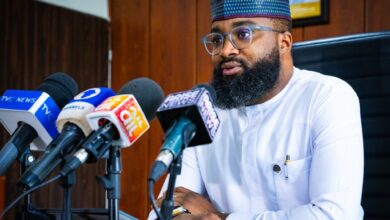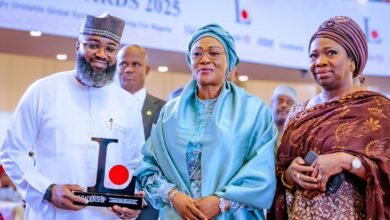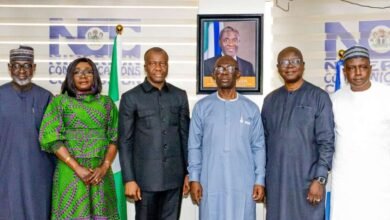
- NCC orders Globacom to split CEO and Chairman roles within 24 months to boost transparency and governance.
- MTN partners with SANTACO to digitise South Africa’s taxi industry with cashless payments and GPS tracking.
- Nigeria’s internet subscriptions hit 142 million as monthly data use doubles in two years.
- 9Mobile rebrands as T2 in bid to revive market share and improve network services.
Globacom Gets 24-Month Ultimatum to Split CEO and Chairman Roles
Nigeria’s telecoms regulator is turning up the heat on corporate governance and Globacom is in the crosshairs. The Nigerian Communications Commission (NCC) has given the operator two years to appoint a chief executive officer separate from its board chairman, billionaire founder Mike Adenuga.
The directive, part of a sweeping set of rules announced on August 7, 2025, is designed to boost accountability, transparency, and operational independence across the industry. It mirrors governance reforms in Nigeria’s banking sector, where splitting the two roles has long been the norm.
All major operators except Globacom — including MTN Nigeria, Airtel, and T2 (formerly 9mobile) — already comply. Adenuga has held both roles since the company’s inception, a structure critics say concentrates too much power in one person. Industry analysts view the NCC’s move as a milestone in modernising the sector’s governance, which could improve decision-making, enhance investor confidence, and foster a healthier competitive environment.
Failure to comply could see Glo hit with sanctions, denting both its operations and brand. But compliance could strengthen its market standing at a time when competition is intensifying.
MTN and SANTACO Join Forces to Modernise South Africa’s Taxi Industry
MTN South Africa has partnered with the South African National Taxi Council (SANTACO) to overhaul one of the country’s most important — and chaotic — transport sectors. The initiative will start in Gauteng, where over 35,000 taxis operate daily, serving millions of commuters.
The plan includes cashless payment systems, real-time GPS tracking, and digital tools to improve safety, efficiency, and communication between drivers and passengers. The upgrades are expected to reduce disputes over fares, cut down on crime, and help drivers manage their businesses more effectively.
The project also has a social mission: by digitising the sector, MTN and SANTACO aim to empower small businesses and create economic opportunities in underserved communities. If successful, Gauteng’s rollout could become the blueprint for a nationwide transformation, potentially changing the face of public transport in South Africa.
Nigeria’s Internet Boom: Data Use Hits Record Levels
Nigeria’s internet economy is in overdrive. According to the NCC, there are now 142.16 million active internet subscriptions — 141.66 million of them on mobile networks — reflecting the country’s heavy reliance on mobile technology.
Monthly data consumption has jumped an eye-watering 93% in just two years, from 517,670 terabytes in January 2023 to over one million terabytes in January 2025. The surge is being driven by smartphone adoption, cheaper data plans, and growing broadband coverage.
Mobile subscriptions have reached 169 million, pushing telecom’s contribution to GDP above 14% — about $10.8 billion in value. This rapid growth has created huge economic opportunities, but it’s also putting pressure on operators to expand infrastructure and maintain service quality in the face of soaring demand.
NCC Tightens Governance Rules to Boost Investor Confidence
In a separate move, the NCC has unveiled new “Guidelines on Corporate Governance for the Communications Industry” aimed at improving transparency and competition.
One headline change is a five-year “cooling-off” period that will bar former top NCC officials — including chairmen, executive vice chairmen, and board commissioners — from taking jobs with licensed telecom companies after leaving office.
Executive Vice Chairman Dr. Aminu Maida says the reforms will protect the sector from conflicts of interest, create a level playing field, and assure investors that Nigeria’s telecoms industry is managed with integrity. “We are committed to fostering an industry where integrity and fairness prevail,” Maida stressed.
The NCC hopes the new rules will cement the sector’s reputation as one of the country’s most attractive for investment, while also improving service delivery for consumers.
From 9Mobile to T2: A Telecom Survival Story
Nigeria’s telecom market has a new player — or rather, an old one with a new identity. 9Mobile, once one of the fastest-growing operators with nearly 13 million subscribers, has rebranded as T2 after years of financial strain and shrinking market share.
The change is more than cosmetic. Backed by regulators and investors, T2 plans to stabilise operations, modernise its network, and win back customers with new products and improved service quality.
The rebrand is seen as a test of whether corporate restructuring can rescue a struggling telecom brand in Nigeria’s highly competitive market. Industry watchers say success would not only revive T2’s fortunes but also inject more competition into the sector, giving consumers better value and service options.




